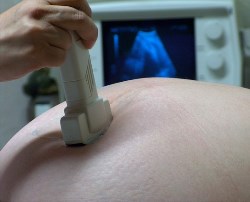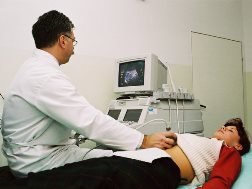How to Enroll in the Best Ultrasound Tech Degree Program near Section Alabama
 Once you have decided to obtain an ultrasound technician degree near Section AL, the next step is to begin the procedure of choosing a college. To begin with, you have to find the right program that will provide the proper training to become a skilled professional. And because a number of states do require that ultrasound techs be either licensed or certified, depending on where you will practice you may also need preparation to pass a licensing or certification exam. So it’s extremely important that you investigate each school in order to evaluate and compare your alternatives. But exactly where does one begin? Many students will begin by searching for colleges that are within commuting distance of their residences and then by comparing tuition. Certainly cost and location should be considered when arriving at a decision, but there are other significant factors as well. For example, if the ultrasound technician schools have earned accreditation or if they offer internships. These and other qualifiers will be covered more in depth later in this post. But to start with, let’s discuss what a sonogram tech does and the degrees and online education options that are available.
Once you have decided to obtain an ultrasound technician degree near Section AL, the next step is to begin the procedure of choosing a college. To begin with, you have to find the right program that will provide the proper training to become a skilled professional. And because a number of states do require that ultrasound techs be either licensed or certified, depending on where you will practice you may also need preparation to pass a licensing or certification exam. So it’s extremely important that you investigate each school in order to evaluate and compare your alternatives. But exactly where does one begin? Many students will begin by searching for colleges that are within commuting distance of their residences and then by comparing tuition. Certainly cost and location should be considered when arriving at a decision, but there are other significant factors as well. For example, if the ultrasound technician schools have earned accreditation or if they offer internships. These and other qualifiers will be covered more in depth later in this post. But to start with, let’s discuss what a sonogram tech does and the degrees and online education options that are available.
Click Here to Get Free Information on Ultrasound Technician Schools!
Sonogram Tech Occupation Description
 There are multiple professional titles for ultrasound techs (technicians). They are also called sonogram techs, diagnostic medical sonographers (or just sonographers) and ultrasound technologists. No matter what their title is, they all have the same primary job description, which is to carry out diagnostic ultrasound testing on patients. Even though many work as generalists there are specialties within the field, for example in pediatrics and cardiology. Most work in Section AL clinics, hospitals, private practices or outpatient diagnostic imaging centers. Typical daily job tasks of a sonogram tech can include:
There are multiple professional titles for ultrasound techs (technicians). They are also called sonogram techs, diagnostic medical sonographers (or just sonographers) and ultrasound technologists. No matter what their title is, they all have the same primary job description, which is to carry out diagnostic ultrasound testing on patients. Even though many work as generalists there are specialties within the field, for example in pediatrics and cardiology. Most work in Section AL clinics, hospitals, private practices or outpatient diagnostic imaging centers. Typical daily job tasks of a sonogram tech can include:
- Keeping records of patient medical histories and specifics of each procedure
- Counseling patients by explaining the procedures and answering questions
- Preparing the ultrasound machines for use and then sterilizing and re-calibrating them
- Escorting patients to treatment rooms and ensuring their comfort
- Using equipment while limiting patient exposure to sound waves
- Evaluating results and identifying necessity for additional testing
Sonographers must regularly evaluate the safety and performance of their equipment. They also are held to a high ethical standard and code of conduct as medical practitioners. In order to sustain that level of professionalism and remain up to date with medical knowledge, they are mandated to complete continuing education courses on a regular basis.
Sonogram Tech Degree Programs Available
 Ultrasound tech students have the opportunity to earn either an Associate or a Bachelor’s Degree. An Associate Degree will usually require around 18 months to 2 years to finish based upon the program and class load. A Bachelor’s Degree will take longer at as long as 4 years to finalize. Another alternative for those who have previously received a college degree is a post graduate certificate program. If you have obtained a Bachelor’s Degree in any major or an Associate Degree in a relevant medical sector, you can enroll in a certificate program that will take only 12 to 18 months to finish. Something to bear in mind is that almost all ultrasound technician programs do have a practical training component as part of their course of study. It often may be fulfilled by participating in an internship program which many colleges sponsor with Section AL clinics and hospitals. When you have graduated from any of the degree or certificate programs, you will then need to fulfill the licensing or certification requirements in Alabama or whatever state you decide to work in.
Ultrasound tech students have the opportunity to earn either an Associate or a Bachelor’s Degree. An Associate Degree will usually require around 18 months to 2 years to finish based upon the program and class load. A Bachelor’s Degree will take longer at as long as 4 years to finalize. Another alternative for those who have previously received a college degree is a post graduate certificate program. If you have obtained a Bachelor’s Degree in any major or an Associate Degree in a relevant medical sector, you can enroll in a certificate program that will take only 12 to 18 months to finish. Something to bear in mind is that almost all ultrasound technician programs do have a practical training component as part of their course of study. It often may be fulfilled by participating in an internship program which many colleges sponsor with Section AL clinics and hospitals. When you have graduated from any of the degree or certificate programs, you will then need to fulfill the licensing or certification requirements in Alabama or whatever state you decide to work in.
Online Sonographer Degrees
 As previously mentioned, almost all sonogram tech schools have a clinical component to their programs. So although you can receive a degree or certificate online, a substantial portion of the training will be either carried out in an on-campus lab or at an authorized off-campus medical care provider. Practical training can often be satisfied by means of an internship at a local Section AL outpatient clinic, hospital or private practice. But the rest of the training and classes can be attended online in your Section home. This is especially convenient for those students that continue working while obtaining their degrees. In addition online schools are many times less expensive than on-campus alternatives. Costs for commuting and study materials can be decreased as well. But similarly as with any sonography college you are reviewing, make sure that the online program you select is accredited. Among the most highly respected accrediting agencies is the Commission on Accreditation of Allied Health Education Programs (CAAHEP). Accreditation is particularly crucial for licensing, certification and finding employment (more on accreditation later). So if you are disciplined enough to attend classes outside of the classroom in the comfort of your own home, then an online school could be the right option for you.
As previously mentioned, almost all sonogram tech schools have a clinical component to their programs. So although you can receive a degree or certificate online, a substantial portion of the training will be either carried out in an on-campus lab or at an authorized off-campus medical care provider. Practical training can often be satisfied by means of an internship at a local Section AL outpatient clinic, hospital or private practice. But the rest of the training and classes can be attended online in your Section home. This is especially convenient for those students that continue working while obtaining their degrees. In addition online schools are many times less expensive than on-campus alternatives. Costs for commuting and study materials can be decreased as well. But similarly as with any sonography college you are reviewing, make sure that the online program you select is accredited. Among the most highly respected accrediting agencies is the Commission on Accreditation of Allied Health Education Programs (CAAHEP). Accreditation is particularly crucial for licensing, certification and finding employment (more on accreditation later). So if you are disciplined enough to attend classes outside of the classroom in the comfort of your own home, then an online school could be the right option for you.
What to Ask Sonogram Tech Programs
 After you have determined which degree or certificate that you would like to obtain, you can initiate the process of assessing and comparing sonogram technician colleges. You will first probably want to decide whether you would rather attend classes online or commute to a school campus in the Section AL area. Certainly location will be critical if you decide on the latter, and the cost of tuition no doubt will be an important qualifier also. But there are other things that you must also take into consideration, for instance if the colleges are accredited and if they sponsor internships. So in order to complete your due diligence so that you can make your final selection, following are several questions that you may want to ask each sonography program before deciding.
After you have determined which degree or certificate that you would like to obtain, you can initiate the process of assessing and comparing sonogram technician colleges. You will first probably want to decide whether you would rather attend classes online or commute to a school campus in the Section AL area. Certainly location will be critical if you decide on the latter, and the cost of tuition no doubt will be an important qualifier also. But there are other things that you must also take into consideration, for instance if the colleges are accredited and if they sponsor internships. So in order to complete your due diligence so that you can make your final selection, following are several questions that you may want to ask each sonography program before deciding.
Are the Sonogram Technician Colleges Accredited? Most ultrasound technician colleges have received some type of accreditation, whether regional or national. Nevertheless, it’s still imperative to confirm that the school and program are accredited. One of the most highly respected accrediting organizations in the field of sonography is the Joint Review Committee on Education in Diagnostic Medical Sonography (JRC-DMS). Programs receiving accreditation from the JRC-DMS have undergone a detailed examination of their instructors and course materials. If the school is online it can also receive accreditation from the Distance Education and Training Council, which targets online or distance learning. All accrediting organizations should be acknowledged by the U.S. Department of Education or the Council on Higher Education Accreditation. Besides ensuring a quality education, accreditation will also help in securing financial assistance and student loans, which are frequently not accessible for non-accredited colleges. Accreditation may also be a pre-requisite for certification and licensing as required. And many Section AL employers will only hire graduates of an accredited program for entry level positions.
Are Internships Sponsored? Ask if the ultrasound tech programs you are assessing have associations with Section AL hospitals or clinics for internship programs. Not only are internships an excellent manner to get practical training in a clinical environment, they are also a way to fulfill the practical training requirement for most programs. As a supplemental benefit, they may assist students and graduates establish professional connections in the Section healthcare community and help with job placement.
Is Job Placement Assistance available? You will probably want to hit the ground running after graduation, but getting that initial job in a new profession can be challenging without help. Ask if the ultrasound tech schools you are reviewing have job placement programs and what their success rates are. Rapid and high placement rates are a good sign that the schools have substantial networks and good relationships with Alabama healthcare employers. It also confirms that their students are highly regarded and sought after.
Where is the Program Located? For a number of students, the school they decide on will need to be within driving distance of their Section AL home. Individuals who have decided to attend classes online naturally will not have to trouble themselves with the location of the campus. However, the availability of area internships will be of importance. One thing to consider is that if you decide to enroll in a college that is out of state or perhaps out of your local area, you may need to pay a higher tuition. State colleges usually charge higher tuitions for out of state residents. And community colleges generally charge a higher tuition to those students that don’t reside within their districts.
How Large are the Classes ? Unless you are the kind of student that likes to sit way in the back of the classroom or hide in the crowd, you will probably want a smaller class size. Small classes permit more individual participation and one-on-one instruction. Ask the schools you are researching what the average teacher to student ratio is for their classes. If practical you may prefer to sit in on one or more classes before making your final decision. This will also give you an opportunity to converse with several of the students and instructors to get their perspectives regarding the ultrasound tech program as well.
Can the College Accommodate your Schedule? And finally you need to verify that the ultrasound tech college you finally pick can provide the class schedule you need. This is particularly essential if you choose to continue working while you attend school. If you need to schedule evening or weekend classes in the Section AL area, confirm that they are available. If you can only enroll on a part-time basis, find out if that is an option and how many courses or credit hours you would have to carry. Also, ask what the protocol is for making up any classes that you may miss as a result of work, illness or family obligations.
Ultrasound Courses Section Alabama
 Selecting the ideal sonographer degree or certificate program is a vital first step to launching a fulfilling new profession providing diagnostic services to patients. Ultrasound technician programs require that you have a high school diploma or a GED. In addition to meeting academic requirements, you should be in at least reasonably good physical condition, able to stand for prolonged durations with the ability to regularly lift weights of 50 pounds or more, as is it frequently necessary to position patients and maneuver heavy equipment. Other preferred talents include technical proficiency, the ability to stay collected when confronted by an anxious or angry patient and the ability to communicate in a clear and compassionate manner. You originally came to this website due to an interest in Ultrasound Courses and wanting more information on Certified Ultrasound Technician Schools. However, as we have covered in this post, there are a number of questions that you need to ask each college you are looking at. This is the case whether you select an online program or commute to the college campus to attend classes. And by asking the proper questions so that you can evaluate each school, you will be able to narrow down your alternatives until you are left with the ideal school for your education. And with the right training, discipline and determination to succeed, you can realize your goal to work as an ultrasound tech in Section AL.
Selecting the ideal sonographer degree or certificate program is a vital first step to launching a fulfilling new profession providing diagnostic services to patients. Ultrasound technician programs require that you have a high school diploma or a GED. In addition to meeting academic requirements, you should be in at least reasonably good physical condition, able to stand for prolonged durations with the ability to regularly lift weights of 50 pounds or more, as is it frequently necessary to position patients and maneuver heavy equipment. Other preferred talents include technical proficiency, the ability to stay collected when confronted by an anxious or angry patient and the ability to communicate in a clear and compassionate manner. You originally came to this website due to an interest in Ultrasound Courses and wanting more information on Certified Ultrasound Technician Schools. However, as we have covered in this post, there are a number of questions that you need to ask each college you are looking at. This is the case whether you select an online program or commute to the college campus to attend classes. And by asking the proper questions so that you can evaluate each school, you will be able to narrow down your alternatives until you are left with the ideal school for your education. And with the right training, discipline and determination to succeed, you can realize your goal to work as an ultrasound tech in Section AL.
More Ultrasound Locations in Alabama
Caesarean section
Caesarean section, also known as C-section, or caesarean delivery, is the use of surgery to deliver babies.[2] A caesarean section is often necessary when a vaginal delivery would put the baby or mother at risk.[2] This may include obstructed labor, twin pregnancy, high blood pressure in the mother, breech birth, or problems with the placenta or umbilical cord.[2][3] A caesarean delivery may be performed based upon the shape of the mother's pelvis or history of a previous C-section.[2][3] A trial of vaginal birth after C-section may be possible.[2] The World Health Organization recommends that caesarean section be performed only when medically necessary.[3][4] Some C-sections are performed without a medical reason, upon request by someone, usually the mother.[2]
A C-section typically takes 45 minutes to an hour.[2] It may be done with a spinal block, where the woman is awake or under general anesthesia.[2] A urinary catheter is used to drain the bladder, and the skin of the abdomen is then cleaned with an antiseptic.[2] An incision of about 15 cm (6 inches) is then typically made through the mother's lower abdomen.[2] The uterus is then opened with a second incision and the baby delivered.[2] The incisions are then stitched closed.[2] A woman can typically begin breastfeeding as soon as she is out of the operating room and awake.[5] Often, several days are required in the hospital to recover sufficiently to return home.[2]
C-sections result in a small overall increase in poor outcomes in low-risk pregnancies.[3] They also typically take longer to heal from, about six weeks, than vaginal birth.[2] The increased risks include breathing problems in the baby and amniotic fluid embolism and postpartum bleeding in the mother.[3] Established guidelines recommend that caesarean sections not be used before 39 weeks of pregnancy without a medical reason.[6] The method of delivery does not appear to have an effect on subsequent sexual function.[7]
